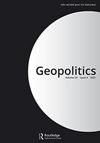The geopolitics of the ‘Modern Breakthrough’: Cultural internationalisation and geopolitical decline in Scandinavia 1870–1914
IF 3
1区 社会学
Q1 GEOGRAPHY
引用次数: 1
Abstract
ABSTRACT The Scandinavian countries of Denmark, Sweden and Norway (sometimes including Finland and Iceland) have been depicted as small states punching above their demographic, political, military or economic weight in international affairs, especially in the post-Second World War era. The article historicises this notion by discussing nineteenth-century Scandinavian cultural elites and opinion makers who began portraying the region as culturally homogenous and distinctly modern. Coincidentally or consequently, this occurred at a time when Sweden and Denmark, having ceded their status as Northern European great powers to Russia and Prussia, were acutely preoccupied with reorienting themselves geopolitically. Expanding on the historiography of global positioning strategies in Scandinavia, the article centres on the interface between the realms of politics and cultural production during this period of transition. It highlights a group of self-declared cultural modernisers that in the 1880s came together under the banner of the Modern Breakthrough. Members of the group merit attention as public intellectuals advocating new ways of understanding Scandinavia’s place in the world by redefining the relationship between the local and the global. By focusing on their role as catalysts in a collective reorientation towards non-military claims to international relevance and status as an example of space-making practices, we can shed new light on region-building in Scandinavia against the backdrop of changing social and political realities.“现代突破”的地缘政治:1870-1914年斯堪的纳维亚半岛的文化国际化和地缘政治衰落
斯堪的纳维亚国家丹麦、瑞典和挪威(有时包括芬兰和冰岛)一直被描绘成在国际事务中超越其人口、政治、军事或经济分量的小国,尤其是在二战后的时代。这篇文章通过讨论19世纪斯堪的纳维亚文化精英和舆论制造者,将这一概念历史化,他们开始将该地区描绘成文化同质和独特的现代。巧合或结果是,这一切发生的时候,瑞典和丹麦刚刚把北欧大国的地位让给了俄罗斯和普鲁士,它们正全神贯注于重新定位自己的地缘政治。在对斯堪的纳维亚全球定位战略的史学研究的基础上,本文集中讨论了这一转型时期政治领域与文化生产之间的联系。它突出了一群自称为文化现代主义者的人,他们在19世纪80年代在“现代突破”的旗帜下走到了一起。该团体的成员作为公共知识分子,通过重新定义地方与全球之间的关系,倡导以新的方式理解斯堪的纳维亚在世界上的地位,值得关注。通过把重点放在它们作为一个空间制造实践的例子,在集体重新调整对国际相关性和地位的非军事要求方面所起的催化剂作用上,我们可以在不断变化的社会和政治现实的背景下,对斯堪的纳维亚的区域建设有新的认识。
本文章由计算机程序翻译,如有差异,请以英文原文为准。
求助全文
约1分钟内获得全文
求助全文
来源期刊

Geopolitics
Multiple-
CiteScore
7.60
自引率
10.30%
发文量
50
期刊介绍:
The study of geopolitics has undergone a major renaissance during the past decade. Addressing a gap in the published periodical literature, this journal seeks to explore the theoretical implications of contemporary geopolitics and geopolitical change with particular reference to territorial problems and issues of state sovereignty . Multidisciplinary in its scope, Geopolitics includes all aspects of the social sciences with particular emphasis on political geography, international relations, the territorial aspects of political science and international law. The journal seeks to maintain a healthy balance between systemic and regional analysis.
 求助内容:
求助内容: 应助结果提醒方式:
应助结果提醒方式:


